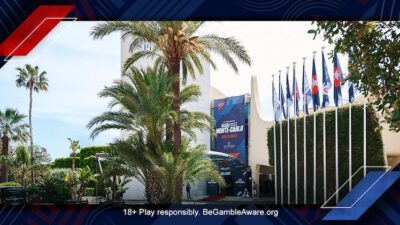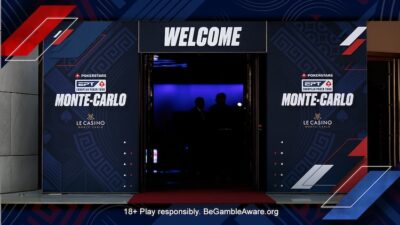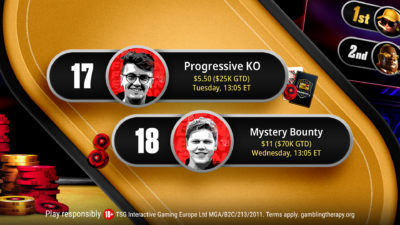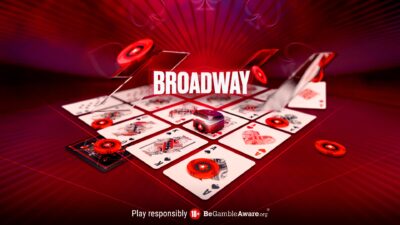The following is a story from a trip PokerStars and the Right To Play charity took to Ghana where PokerStars’ donations are working to help vulnerable children. For previous coverage, see Hidden hope and the Princess of Jamestown on the PokerStars Blog.
Yahaya stood on crooked legs. He smiled as other children ran all around him. He could stand, but walking was a struggle.
Around Yahaya were the 115 students of the New Horizon Special School. From the front, it looked a bit like a wartime building. Faded paint. Bars on the windows. A simple sign on the front that gave nearly no indication what happened behind its walls.
The students inside ranged in age from two to 60 years old.
“Tomorrow, all of you come in your yellow,” Jocelyn Adoboe told them the day before.
The yellow shirt.
That shirt and what it meant was reason for Yahaya to celebrate a life few people can imagine.
New Horizon
The New Horizon Special School sits in Accra, Ghana, a place where it seems almost everyone is vulnerable to something: poverty, disease, abuse, and countless other issues. It’s a developing nation, but it is also one that endures a kind of abject need that the populations of First World nations don’t know.
Inside the school sit some of the most vulnerable of Ghana’s people. Each one of them lives with Down syndrome, autism, Cerebral Palsy, or some other developmental issue that makes it impossible for them to go to a traditional school. In a country where getting an education is a struggle in itself, New Horizon is a safe haven for a part of the population that would otherwise be cast out.
Sue Hammett, PokerStars Head of Corporate Giving, saw it firsthand when she visited the school in October.
“These are people who are stigmatized in Africa to a greater degree than elsewhere, mainly through ignorance and fear, or a deep rooted religious belief that they are cursed,” Hammett said. “For these children and adults, their opportunities in a country like Ghana are limited, and the challenges they face are increased.”
Hammett had traveled to the school with a delegation of PokerStars employees and members of the Right To Play charity, a group that has spent the past 15 years developing games to teach and empower children all over the world to overcome the sometimes overwhelming challenges of poverty, disease, and conflict.
Hammett looked out across the green field of smiling faces and realized something.
“The New Horizon School is their sanctuary,” she said.
The Right To Play Way
Jocelyn Adoboe knows the struggle. She sees it every day as she works with a student body that offers challenges like almost no other school.
“There are times they come in and they are so low,” Adoboe said.
It’s Adoboe’s job and the job of her coworkers at New Horizon to find ways to make each student find their own reason to smile. Over the years, she’s seen those reasons multiply more times than she can count. That’s happened in part because of the support PokerStars and Right To Play offer.
“All the children who take part in Right To Play programs are vulnerable, but not all are socially excluded,” Hammett said. “Right To Play gives these children a real chance of a future, and as a company, through PokerStars’ funding, we are helping them do that.”
The Right To Play way means on the Yellow Shirt Days at New Horizon (one of several schools and facilities in Ghana that Right To Play supports), the students go outside and play games. From above, it may look like nothing more than children running around, but at its roots, the philosophy teaches the students life skills.
Ghana is a place where instruction about First World hygiene is in short supply. One Right To Play game looks like a relay race, but what it actually does is teach these children to throw away garbage when they find it.
“When we finished the game, one of them was prompting another to pick up the trash,” Adoboe said.
Beyond that, the students at New Horizon use games to learn how to wait their turn, cooperate with their classmates, and make choices that will benefit them and others. They think they’re playing when they are actually learning. That’s how Right To Play works here, in other schools around Ghana, and in a dozen countries around the world.
“School is everything for them. They are so happy, and parents are like ‘What is it that happens here that makes them so happy?’ They are so happy to come to school. They feel accepted because of the warmth they feel,” Adoboe said.
Beyond warmth, there is purpose.
The physical education can often take the place of physical therapy. Many of the children at the school are in wheelchairs, and the games are adapted so they can play, too. Even more of the students need some sort of physical regimen. Teachers at the school say every student dreads the idea of sitting through painful therapy, but they will happily work out in the grass.
When the games are finished, the children learn in classrooms. Those with the ability to do so receive vocational training. They learn to weave, make jewelry from beads, and cook. Though it may take place in a facility designed for children, it allows disabled adults with no other place to go a chance to learn a trade.
“We don’t have centers like the developed countries where they can move in or facilities that are designed for them. So as much as possible, we try to engage them in the workshops after they have finished their educational skills,” Adoboe said. “The progress we see, we celebrate it.”
At any given moment on the New Horizon playground field, a child could run at full speed and slam into you as if it’s the most normal thing in the world. Another child might steal your cap and run around for 20 minutes with it on his head. Still another might take your hand and guide you along a path simply for the joy of touching someone else.
“They children are so affectionate. When you come here, you can’t help but get involved. They are so happy to have us there. They are so ready to mingle and feel the sense of acceptance,” Adoboe said.
That fact was never more clear than when the Right To Play delegation met Isaac. Though he hadn’t come in his yellow shirt that day, he was more engaged than any other student on the field.
Isaac was 15 years old and convinced he was as much a part of the teaching as he was the learning.
“I like helping disabled children,” he said as children ran all around him.
He was a football fanatic ready to engage every member of the delegation in conversation. He draped his arms over the visitors’ shoulders and smiled for everyone to see. In a matter of a couple of hours, it was as if the Right To Play group was part of his family.
Later, as the group began packing up, Isaac looked for a moment as if he didn’t believe it.
“You’re not leaving?” he asked. When told the group had an appointment elsewhere, he rationalized it. “Well, you’ll be back.”
It was tough to hear. Isaac had adopted the newcomers and couldn’t see any reason they wouldn’t stay forever.
Sue Hammett walked away from the group, stood on the edge of the grass, and cried.
“The love and warmth we all received that day from the students completely floored me. After we said goodbye to them all and sat around with the teachers for a debrief, I listened to some heartbreaking stories about some of the children who came there,” she said. “I felt the tears flowing as I listened to stories of how some of the students had been treated and of the daily battles some of them face. The tears continued to flow when I heard stories of real hope and how they are all made to feel that they have an important place in society.”
For many in the group, acclimating to the group of challenged people wasn’t easy. In the end, it was harder to leave them behind.
Nevertheless, they went with story of Yahaya, a young boy who found it hard to even to walk. His muscles didn’t work the way they were supposed to. In a country full of people who need help, Yahaya needed more than most.
Still, he was excited when Adoboe told his classmates, “Tomorrow, all of you come in your yellow.”
Adoboe kneeled down to ask Yahaya why he was so happy about a day of physical education.
That’s when the little boy who could barely walk told his secret.
What was so special to him about those days?
“That’s when we run,” he said.
Previously: Hidden hope and the Princess of Jamestown
Brad Willis is the PokerStars Head of Blogging. Follow him on Twitter: @BradWillis.

















